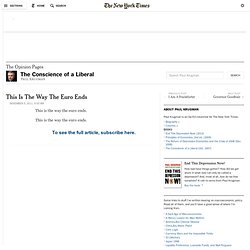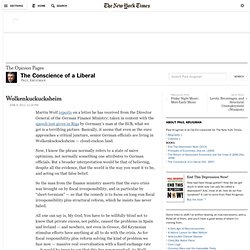

Guess Who’s Designing Europe’s New Tax System? By Don Quijones, Spain & Mexico, editor at WOLF STREET.

Given the scale of last year’s Lux Leaks scandal as well as the revelations early this year about HSBC’s massive Swiss-based tax avoidance swindle, it’s hardly a surprise that the issue of tax compliance is high on the agenda in Europe these days. Most European taxpayers, many of whom pay upwards of 30% income tax, were less than enamoured with news that Europe’s richest individuals and corporations were paying next to nothing (and in some cases nothing) in tax – and all with the help, no less, of the recently unelected president of the European Commission, Jean Claude Juncker.
Willy Wimmer: "System-Neige" im Westen — RT Deutsch. Nicht erst seit der Flüchtlingskrise schwindet in Deutschland das Vertrauen in das politische Establishment.

Doch dieses zeigt sich unbeeindruckt und scheint den eingeschlagenen Kurs weiter verfolgen zu wollen. Krise der Eurozone: Mit dem Spardiktat gegen das europäische Sozialmodell. 10.07.2015 13:40 UhrVon Harald Schumann Die Ignoranz der Euro-Lenker nährt einen bösen Verdacht: Es geht ihnen gar nicht um Prosperität, sondern um den Rückbau des Wohlfahrtsstaates.

Ein Kommentar. Greece is a sideshow. The eurozone has failed, and Germans are its victims too. Nearly every discussion of the Greek fiasco is based on a morality play.

Call it Naughty Greece versus Noble Europe. Those troublesome Greeks never belonged in the euro, runs this story. Once inside, they got themselves into a big fat mess – and now it’s up to Europe to sort it all out. Those are the basics all Wise Folk agree on. Then those on the right go on to say feckless Greece must either accept Europe’s deal or get out of the single currency. Griechenland ist ein Nebenschauplatz. Die Eurozone ist gescheitert und Opfer sind auch die Deutschen.
My ugly dream. Neo-liberal capture of the policy making process in Europe. Mainstream macroeconomics has mounted a range of arguments over the years to argue against any discretionary involvement by governments or regulators in the economy.

The claim is always that the ‘market’ will self regulate and weed out bad players and produce the best outcomes with the least resources each period of activity. Various fancy terms are introduced into textbooks that make these arguments seem to have scientific weight. In narratives, there is often claims that left-wing groups blurred as trade unions have too much influence on political processes, particularly when a non-conservative party is in power.
Krisenpolitik in der EU: Lohnquoten im freien Fall. In der Krisenpolitik von Kommission und Mitgliedstaaten der Europäischen Union spielen Senkungen der Löhne von Arbeitnehmerinnen und Arbeitnehmern eine zentrale Rolle.

Das Instrumentarium dafür ist breit und reicht von direkten Lohndiktaten im öffentlichen Dienst und bei Mindestlöhnen bis hin zu einer systematischen Schwächung der Beschäftigten und ihrer Gewerkschaften. Der „Erfolg“ dieser Maßnahmen ist beobachtbar: Die Lohnquoten sinken, und spiegelbildlich entfällt ein immer größerer Anteil der volkswirtschaftlichen Produktion auf Kapital- und Gewinneinkommen. Sowohl in den Auflagen der so genannten Troika aus EU-Kommission, Europäischer Zentralbank und Internationalem Währungsfonds als auch in den Vorschlägen, Forderungen und Beschlüssen der EU-Kommission und der EU-Mitgliedstaaten zur europäischen Krisenpolitik tauchen immer wieder die gleichen Maßnahmen auf, mit denen man die “Wettbewerbsfähigkeit” in Europa erhöhen möchte.
Ménage à Trois. The Strange Non-Death of Neoliberalism. Colin Crouch urges us to rethink the role of giant corporations in the state vs market analysis of neoliberalism Neoliberalism has ruled the Western world and most of the globe since the 1970’s. It is based on a market-driven approach to monetary policy and it promotes control of the economy by the private sector, which is supposedly more efficient than the public sector. For many, the recent financial collapse provided a strong blow to neoliberal economic theories.
Indeed, the collapse was seen as a failure of banks, champions of neoliberalism and driven by profit maximization. In the immediate aftermath of the crisis, European and international heads of state advocated firmer policy towards the market. This Is The Way The Euro Ends. This is the way the euro ends.

Not with a bang but with bunga-bunga. Seriously, with Italian 10-years now well above 7 percent, we’re now in territory where all the vicious circles get into gear — and European leaders seem like deer caught in the headlights. And as Martin Wolf says today, the unthinkable — a euro breakup — has become all too thinkable: A eurozone built on one-sided deflationary adjustment will fail. That seems certain. Every even halfway plausible route to euro salvation now depends on a radical change in policy by the European Central Bank. Schuldenkrise: Die wahren Gründe für die Sparpolitik. Joseph Stiglitz - Ratlose Rettungsversuche. Will German indecision on the euro drag the whole world down? For Germany, Austerity Elsewhere in Europe Is a Harder Sell. Kolumne: Thomas Fricke - Merkel stalkt Europa ins Desaster. The global economy: Start the engines, Angela. Olivier Blanchard and TINA. Olivier Blanchard is the chief economist of the IMF and he has a blog on the IMF website.

Blanchard’s latest post ( takes up the question of whether there is any alternative to the austerity programme imposed on Greece and other southern European governments to get their economies out of the depression they have entered. Blanchard argues the position of mainstream economics and the dreaded Troika (the EU Commission, the IMF and the ECB), namely that the governments of Greece, Portugal, Ireland, Spain and Italy have amassed too much government debt to fund lifestyles they don’t earn. They need to reduce that debt and that can only be done by increasing ‘competitiveness’. According to Blanchard, there are two ways to become more competitive: become much more productive or reduce wage and non-wage costs. Kolumne: Europas arrogante Elite. 31.

Oktober 2011. Paul Krugman zur Euro-Krise. Die Frankfurter Rundschau druckte am 31. Wolkenkuckucksheim. Martin Wolf reports on a letter he has received from the Director General of the German Finance Ministry; taken in context with the speech just given in Riga by Germany’s man at the ECB, what we get is a terrifying picture.

Basically, it seems that even as the euro approaches a critical juncture, senior German officials are living in Wolkenkuckucksheim — cloud-cuckoo land. Now, I know the phrase normally refers to a state of naive optimism, not normally something one attributes to German officials. But a broader interpretation would be that of believing, despite all the evidence, that the world is the way you want it to be, and acting on that false belief. So the man from the finance ministry asserts that the euro crisis was brought on by fiscal irresponsibility, and in particular by “short-termism” — so that the remedy is to focus on long-run fiscal irresponsibility plus structural reform, which he insists has never failed.
How to Create a Depression. Exit from comment view mode. Click to hide this space CAMBRIDGE – European political leaders may be about to agree to a fiscal plan which, if implemented, could push Europe into a major depression. To understand why, it is useful to compare how European countries responded to downturns in demand before and after they adopted the euro. Consider how France, for example, would have responded in the 1990’s to a substantial decline in demand for its exports. If there had been no government response, production and employment would have fallen. In addition, the fall in export demand would have automatically caused the franc’s value to decline relative to other currencies, with lower interest rates producing a further decline.
There is a great sense of denial in Europe. Davos – an exercise in denial not solutions. A Summit to the Death. Exit from comment view mode. Click to hide this space OXFORD – As many feared and most expected, the just-concluded European summit left much to be desired. Once again, Europe’s national leaders showed themselves to be in denial about what underlies the eurozone’s economic, banking, and sovereign-debt crises, and thus hopelessly unable to resolve them.
One lesson that the world has learned since the financial crisis of 2008 is that a contractionary fiscal policy means what it says: contraction. The European Union and the rhetoric of immaturity. Vitoria-Gasteiz, Spain - More than two hundred years after the death of Immanuel Kant, the question of political enlightenment is still a hot issue in Europe. What does it take to attain both individual and collective autonomy and the capacity for self-governance? Who has managed to throw away the shackles of "self-incurred immaturity", as Kant famously put it, and to be in full control of oneself, as well as of one's political state? The European Union operates on the assumption that certain member countries, with excessive amounts of unsustainable sovereign debt, are not as enlightened as others. Why the EU summit decisions may destabilise government bond markets. This was the nth summit meeting of European leaders billed as finally solving the Eurozone crisis. Yet there were a number of important and useful decisions taken at last week’s summit: A new banking union with a European supervisor that has some teeth; andthe possibility of organising recapitalisations of banks at the European level.
Der europäische Pleitedamm bricht.